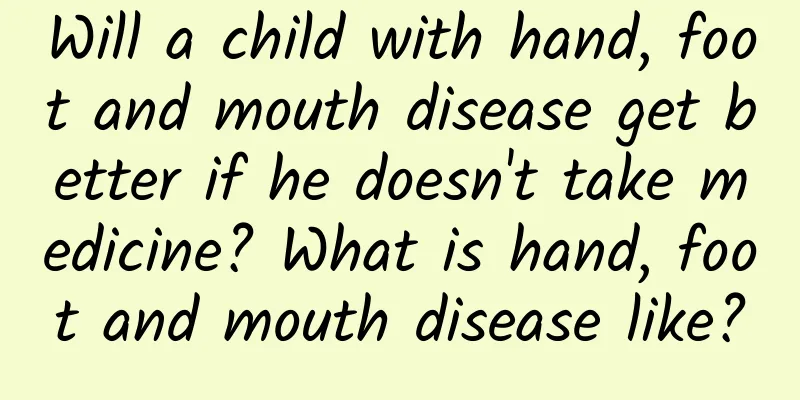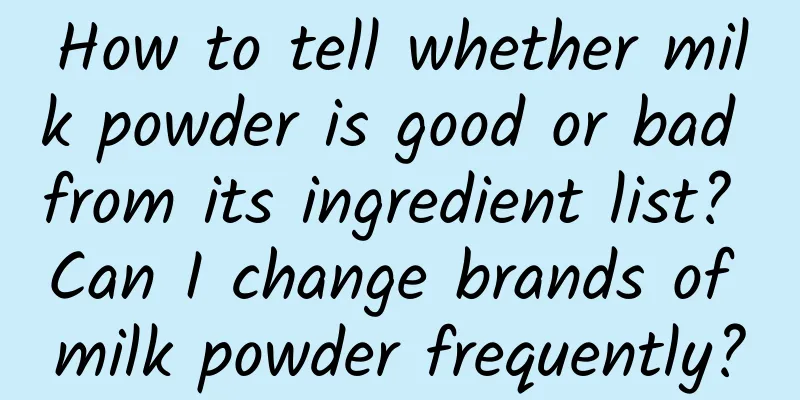Will a child with hand, foot and mouth disease get better if he doesn't take medicine? What is hand, foot and mouth disease like?

|
Hand, foot and mouth disease is an infectious disease that children are more likely to get. It is mainly caused by enterovirus, which will cause rashes or herpes on the hands, feet, mouth and other parts of the baby. So if a child gets hand, foot and mouth disease and does not take medicine, will it get better on its own? What are the symptoms of hand, foot and mouth disease? Will a child with hand, foot and mouth disease get better if he doesn't take medicine?Hand, foot and mouth disease may heal itself without taking medicine because viral infections are self-limiting. Most children can recover within a week, but a few may develop complications such as myocarditis, pulmonary edema, and aseptic meningoencephalitis. The most important thing for children with severe hand, foot and mouth disease is early identification and early treatment. 1. If the baby has been vaccinated with hand, foot and mouth virus vaccine, the age of onset is over five years old, and there is no nervous system involvement, such as no startle, tremors, convulsions, poor spirits, etc., the condition can be treated by drinking more water, paying attention to rest, and reducing fever. No special medication is needed, and the condition will improve in about a week. 2. If the baby is young, the disease progresses rapidly, the high fever is difficult to reduce, the nervous system is involved, or there are other underlying diseases, it needs to be taken seriously and it is recommended to see a doctor in person. What is hand, foot and mouth disease?Hand, foot and mouth disease is so named because it usually causes mouth pain, small blisters or ulcers on the hands, feet, mouth, etc., and usually causes anorexia and low fever. Hand, foot and mouth disease can be easily confused with other symptoms such as urticaria, rash, chickenpox, viral encephalitis or meningitis, so it is necessary to go to the hospital for a combined etiology or serology diagnosis. Children with hand, foot and mouth disease in the following situations may develop severe hand, foot and mouth disease and need special attention: 1. Continuous high fever, higher than 39°C, and conventional antipyretic effect is poor; 2. Symptoms such as mental depression, headache, nystagmus or upward eye movement, vomiting, easy startle, limb tremors, sucking weakness, and instability when standing or sitting; 3. Breathing becomes faster, slower or irregular; 4. Heart rate increases to over 160 beats/min, cold sweats, cold limbs, pale skin, and increased blood pressure; 5. Increased peripheral blood leukocyte count; 6. Increased blood sugar; 7. Increased blood lactate. How to care for hand, foot and mouth diseasehealthWear pure cotton clothes to minimize friction on the affected area. Choose soft, thin and comfortable clothes. Do not let your child use diapers frequently. Use thin, breathable diapers. Keep your baby's buttocks clean and dry. Clean the baby's stools and urine in time to prevent bacteria from infecting the affected area. Some affected areas can be treated with ointments prescribed by doctors. When your baby's skin is itchy, you can use some medical lotions to relieve the symptoms. dietHand, foot and mouth disease not only causes wounds on the hands and feet, but also in the mouth. If the baby also has rashes in the mouth, it is very difficult for him to eat. Mothers should pay attention to the diet. For example, prepare some soft and easy-to-digest food, but nutrition and energy are indispensable. Because the body is uncomfortable at this time, it is definitely not possible to eat much, so nutrition must keep up. Do not feed acidic foods, such as oranges. Milk and porridge are good choices. Be careful to let it cool down a little, and do not eat hot food. OralEnsure that your baby's oral cavity is clean. Brushing teeth may touch the wound, so generally choose to rinse the mouth with water to avoid excessive bacteria in the mouth and cause more infection. In addition, don't take your children to crowded places as they will already be sick and uncomfortable, and there are more germs outside. |
Recommend
Calcium supplementation has no effect? If you ignore these points, calcium supplementation is just a waste of effort!
Calcium is an essential element for the human bod...
I want to defecate when I have a contraction_I want to defecate when I have a contraction
Some women do not feel abdominal pain when they h...
What causes hair loss during breastfeeding?
One of the more depressing things after giving bi...
Female urine test shows occult blood
In urine tests, some patients' test results w...
What to do if there are small nodules in the breast
What should I do if I have small nodules in my br...
Introduction to women's preparations before having a baby
Many young people of this generation are afraid o...
How many years does cervical cancer usually develop?
Cervical cancer is indeed a gynecological disease...
How to tell whether a turtle is wild or farmed? The difference between wild and farmed turtles
Turtle, also known as turtle, is often called &qu...
What are the pros and cons of medical abortion?
Medical abortion is a common method of abortion, ...
Fetus born on metformin
Key reminder: Drugs such as metformin are very he...
There is a small painful lump inside the nipple, what should I do?
For most women, the breasts are a very sensitive ...
Why does medical abortion cause heavy bleeding?
Medical abortion is a method of abortion suitable...
Women’s menstrual discomfort is caused by these diseases!
Many women feel that they may experience discomfo...
Can baking soda be used to wash the vagina to treat gynecological diseases?
Gynecological diseases are a very common disease ...
How long after giving birth can I have an IUD inserted?
After giving birth, women have to consider contra...









